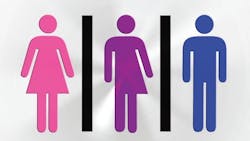Supreme Court denies appeal of Pennsylvania district's transgender policy
The U.S. Supreme Court has left in place a lower court ruling in favor of a Pennsylvania school district policy that allows transgender students to use bathrooms that match their gender identity.
Philly.com reports that the decision, issued in a one-line order, effectively ends a legal fight that has roiled the the Boyertown Area School District since 2017.
The justices rejected an appeal from a conservative legal organization representing six students who say they felt uncomfortable with transgender teens using the restrooms of their choice.
“This is an enormous victory for transgender students across the country,” says Ria Tabacco Mar, a senior staff attorney with the American Civil Liberties Union, which intervened in the case on behalf of the Pennsylvania Youth Congress, a coalition of LGBTQ youth leaders. “Boyertown’s schools chose to be inclusive and welcoming of transgender students … This lawsuit sought to reverse that hard-won progress.”
Meanwhile, Christiana Holcomb, legal counsel for the Alliance Defending Freedom, the Christian advocacy law firm that represented the suing students, vowed that her firm’s fight on the issue would continue.
“We hope the Supreme Court will eventually weigh in to protect students’ constitutional right to bodily privacy,” Holcomb says.
The Supreme Court’s decision on Tuesday leaves standing an earlier ruling by a three-judge panel of the U.S. Court of Appeals for the Third Circuit.
Circuit Judge Theodore McKee said at the time that the students had failed to show that they were irreparably harmed by the school district’s policy.
The district put its transgender bathroom policy into place in 2016 under Obama-era guidelines that required all federally funded school districts to recognize basic transgender student rights. The district chose to stick with its guidelines after the Trump administration eliminated those standards soon after taking office.
To accommodate anyone who felt uncomfortable, the district increased the number of single-user bathrooms, alternative locker rooms and private stalls.
The six students who filed suit in 2017 argued that the policy effectively forced them into using the alternative facilities — a move they described as a form of discrimination.
About the Author
Mike Kennedy
Senior Editor
Mike Kennedy, senior editor, has written for AS&U on a wide range of educational issues since 1999.
